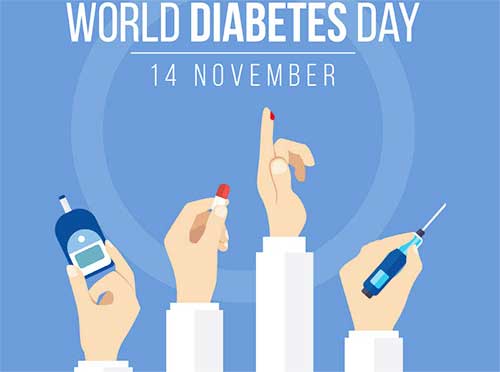
World Diabetes Day, observed annually on November 14, is a global campaign that raises awareness about diabetes, its risks and complications, and the importance of prevention and effective management. As diabetes continues to affect millions of lives worldwide, this day reminds us of the collective efforts needed to combat this chronic condition. Since its establishment in 1991 by the International Diabetes Federation (IDF) and the World Health Organization (WHO), World Diabetes Day has grown into the largest diabetes awareness initiative worldwide.

In this article, we'll explore the background and significance of World Diabetes Day, discuss the primary types of diabetes, highlight the theme of the day, and share actionable ways individuals and communities can support this vital cause.
The History and Purpose of World Diabetes Day
World Diabetes Day was established to draw attention to the growing health concerns posed by diabetes, particularly Type 2 diabetes, which is largely preventable. Its founders intended for the day to highlight issues related to diabetes, such as education, prevention, and access to affordable treatment. November 14 was chosen as it marks the birthday of Sir Frederick Banting, who, along with Charles Best, discovered insulin in 1921—a life-saving treatment that remains essential for people with diabetes.
Rising Diabetes Statistics: A Global Health Concern
Diabetes affects people of all ages and backgrounds. According to the International Diabetes Federation (IDF), over 537 million adults worldwide are currently living with diabetes, and this number is expected to rise to 643 million by 2030. The condition can lead to serious health complications such as heart disease, stroke, kidney failure, blindness, and lower-limb amputation. The high and growing prevalence makes it a critical public health issue, one that calls for immediate action and long-term commitment from individuals, healthcare providers, and policymakers alike.
Types of Diabetes and Their Impact on Health
Understanding the different types of diabetes is essential for recognizing the risks and the distinct approaches needed for management.
1. Type 1 Diabetes: Type 1 diabetes is an autoimmune condition where the body's immune system attacks insulin-producing cells in the pancreas. As a result, people with Type 1 diabetes require lifelong insulin injections to manage blood sugar levels. Although the cause is not fully understood, genetic and environmental factors are believed to play a role. Type 1 diabetes often appears in childhood or adolescence but can also develop in adults.
2. Type 2 Diabetes: Type 2 diabetes, which accounts for about 90% of all diabetes cases, is largely preventable. This condition occurs when the body becomes resistant to insulin or when the pancreas fails to produce sufficient insulin. Risk factors include obesity, physical inactivity, poor diet, and genetics. Type 2 diabetes is commonly diagnosed in adults, but cases among younger people are increasing due to lifestyle factors.
3. Gestational Diabetes: Gestational diabetes develops during pregnancy and can affect both the mother and the child if left unmanaged. Women with gestational diabetes have a higher risk of developing Type 2 diabetes later in life, and their children are also at risk of obesity and Type 2 diabetes in the future.
World Diabetes Day Theme: A Call to Improve Access to Care
Each year, World Diabetes Day focuses on a particular theme to address current challenges faced by those with diabetes. The theme for 2021-2023 is "Access to Diabetes Care." This theme emphasizes the importance of ensuring that everyone affected by diabetes has access to the medicines, technologies, support, and care they need to manage the condition successfully. Despite advancements in diabetes treatment, millions of people worldwide cannot afford or access the care they need. This campaign encourages governments, health organizations, and individuals to work together to bridge this gap.
The Role of Education in Diabetes Prevention and Management
Education is a critical element in the fight against diabetes. Knowing the risk factors, symptoms, and lifestyle changes necessary to prevent and manage diabetes can make a significant difference. For example, maintaining a healthy diet, engaging in regular physical activity, and avoiding tobacco use can significantly reduce the risk of developing Type 2 diabetes. Education also empowers people with diabetes to monitor their blood sugar levels, recognize symptoms of hypo or hyperglycemia, and understand when to seek medical assistance. Schools, workplaces, and community centers play an essential role in disseminating this vital information and helping individuals make informed choices.
Importance of Regular Screening and Early Detection
Diabetes can often go undiagnosed until complications arise, making regular screening vital, especially for those with risk factors such as family history, obesity, or high blood pressure. Early detection of diabetes allows for prompt treatment, which can delay or prevent complications. Regular check-ups, including blood glucose tests and A1C tests, are essential tools for catching diabetes in its early stages or monitoring existing diabetes more effectively. Healthcare providers, local clinics, and wellness programs should encourage and facilitate routine screenings, particularly for high-risk populations.
Managing Diabetes with a Healthy Lifestyle
A healthy lifestyle is one of the most powerful tools in managing diabetes. Here are some key areas that individuals can focus on:
• Balanced Diet: A diet rich in fruits, vegetables, whole grains, and lean proteins can help manage blood sugar levels and maintain a healthy weight. People with diabetes should limit refined sugars and carbs, opting instead for complex carbohydrates with a low glycemic index.
• Physical Activity: Regular exercise helps regulate blood sugar levels, improve cardiovascular health, and promote weight loss. Activities like walking, swimming, and strength training can benefit those with diabetes or those at risk.
• Weight Management: Obesity is one of the leading risk factors for Type 2 diabetes, so maintaining a healthy weight is critical. Losing even a small amount of weight can have a significant impact on blood sugar control.
• Stress Management: Chronic stress can elevate blood sugar levels, so adopting stress-relieving practices like yoga, meditation, and deep breathing exercises can aid in diabetes management.
World Kindness Day Inspiring Compassion and Connection Worldwide
While World Diabetes Day focuses on diabetes awareness, it's worth noting that November also celebrates World Kindness Day, which encourages acts of compassion and kindness around the globe. There's a strong connection between these two observances, as kindness and community support can positively impact the lives of those living with chronic illnesses. Small acts of kindness—such as checking in on a loved one with diabetes, joining them on a walk, or simply being understanding of their needs—can make a significant difference. A supportive network is invaluable to those managing diabetes, as it boosts emotional well-being and reinforces healthy habits.
Supporting World Diabetes Day Activities and Campaigns
Participating in World Diabetes Day can be a fulfilling way to support those affected by diabetes and contribute to global awareness. There are numerous ways to get involved, such as:
• Wear Blue: The blue circle is the global symbol of diabetes awareness. Wearing blue clothing or a blue circle pin shows solidarity with the diabetes community.
• Social Media Campaigns: Spreading awareness through social media platforms can reach a vast audience. Use hashtags like #WorldDiabetesDay, #DiabetesAwareness, and #AccessToDiabetesCare to amplify the message.
• Organize or Participate in Local Events: Many organizations and communities host events such as walks, runs, and seminars on World Diabetes Day. Attending or organizing these events helps raise funds and awareness while fostering a sense of community.
• Advocacy: Advocate for policies that improve access to affordable diabetes care and encourage educational programs. Support organizations working to make insulin and other diabetes treatments accessible to all.
The Power of Research and Innovation in Fighting Diabetes
Continuous research and innovation are essential for improving diabetes care. Scientists and researchers worldwide are working tirelessly to develop new treatments, improve existing therapies, and find ways to prevent diabetes altogether. For instance, advancements in glucose monitoring technology, such as Continuous Glucose Monitors (CGMs) and insulin pumps, have made managing diabetes more convenient and accurate. New medications and approaches, such as gene therapy and regenerative medicine, also hold promise for the future of diabetes care.
Individuals can contribute to the global fight against diabetes by supporting research organizations through donations, participating in clinical trials, and staying informed about the latest scientific breakthroughs.
Promoting Healthy Environments for Future Generations
To prevent future generations from facing the exact diabetes epidemic, it's crucial to promote healthier environments. Schools can implement nutritious meal programs, businesses can encourage active lifestyles through wellness programs, and governments can work to reduce the availability of high-sugar, high-fat foods. Family education on nutrition and physical activity helps young people develop habits that reduce their risk of diabetes. These collective efforts can create a healthier world with fewer cases of Type 2 diabetes.
Recognizing the Importance of Collective Action
World Diabetes Day serves as a global platform to raise awareness, encourage action, and support those affected by diabetes. It reminds us that preventing and managing diabetes is not solely the responsibility of healthcare professionals or individuals; it requires community support, educational initiatives, and policies that prioritize health and access to care. As the diabetes crisis grows, the significance of World Diabetes Day becomes ever more critical. Whether through raising awareness, supporting research, or simply wearing blue, each of us can contribute to a future where diabetes is better understood, prevented, and managed effectively. Together, we can work towards a world where everyone has the resources and knowledge needed to live a healthy life, free from the burdens of diabetes.



